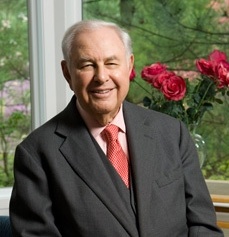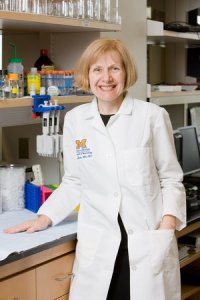
Planned research into Lou Gehrig’s disease could let patients bank own stem cells for treatment
Those afflicted with the deadly, degenerative neurological condition called Lou Gehrig’s disease could eventually bank their own stem cells for later treatment.
That’s the hope driving new research funded by billionaire mall mogul and Pontiac native Alfred Taubman.

Photo courtesy of the University of Michigan
This week, Taubman announced a new collaboration between University of Michigan neurologist Dr. Eva Feldman, the director of the A. Alfred Taubman Medical Research Institute within the U-M Medical School, and Israeli doctor Benjamin Reubinoff of the Hadassah Medical Center in Jerusalem.
Amyotrophic Lateral Sclerosis, also known as Lou Gehrig’s disease or ALS, is a neurological condition that robs its victims of their ability to speak, move and eventually breathe, while leaving their minds alert.
Taubman’s friend, long-time U.S. Sen. Jacob Javits of New York, died from the disease.
Taubman said his interest in helping to fund ALS research stems in part from an observation that pharmaceutical companies don’t seem to be too interested in doing so. ALS kills its victims relatively quickly and affects a relatively small number of individuals. About 5,600 new cases are diagnosed a year, according to the ALS Association.
In 2007, Taubman’s $22 million gift to the University of Michigan Health System created his namesake institute. Taubman-backed scientists and scholars are searching for cures and exploring treatments for ALS, as well as adult and childhood cancers, using different kinds of human stem cells.
The planned research
While the scientists’ plan is complicated, it will work like this, Feldman said:
Eva Feldman and her team will cull adult stem cells from the skin of ALS patients.
Benjamin Reubinoff will genetically reprogram those adult stem cells at Hadassah Medical Center in Jerusalem to act like human embryonic stem cells. Human embryonic stem cells have the ability to change into any cell in the body and divide in perpetuity, while adult stem cells have a specific role and can’t divide forever.
The researchers hope to use this work to develop human tissue in test tubes, which will allow for further exploration into causes of and cures for ALS, without using human test subjects.
Separately, Feldman is overseeing the first human trial that involves injecting stem cells into the spines of ALS patients in order to halt the destruction of nerve cells by the disease.
The study is being conducted at the Neuromuscular Laboratory at Emory University in Atlanta with Feldman on board as a consultant to Neuralstem Inc., the trial’s sponsor.
“But those patients are getting someone else’s stem cells, and they require immune suppression,” she said.

Photo courtesy of the University of Michigan
The planned research could compliment the work Feldman is doing. It would be better for the patient, she said, to bank his own stem cells for use in the regenerative treatment she is exploring.
Feldman’s trial looks promising so far, Taubman said.
“We’ve certainly progressed with those peole that have ALS,” he said. They’re feeling better, moving their extremities for the first time in a year or two.”
Taubman and a grant from the United States-Israel Binational Science Foundation are funding the new collaboration.
“I’m very proud to be able to do it,” said Taubman, who dropped out of U-M before founding in 1950 what would become one of the most successful high-end retail businesses in history. “These are highly intelligent people who are creative and work very hard to try to cure these diseases, and I’m equally proud of the fact it’s being done here in Michigan.”
Taubman’s gifts to U-M top $80 million.
Taubman, who is estimated by Forbes to be worth $2 billion, declined to say how much he has donated to foster the collaboration, which he announced via e-mail this week.
###
Juliana Keeping is a health and environment reporter for AnnArbor.com. Reach her at julianakeeping@annarbor.com or 734-623-2528.
View original article